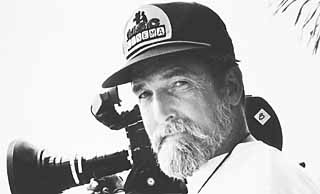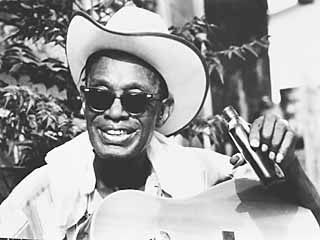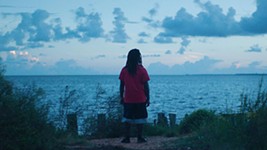Blank's Slates
By Anne S. Lewis, Fri., June 18, 1999
|
|
Les Blank is a man of few words and many films. Something of an anomaly -- or maybe just an old hippie -- at 63 with over 30 documentaries in the can, he's still single-mindedly panning the world through a camera viewfinder, looking for revelation and celebration in life's quirky, telling detail. Blank's long and varied cinematic juggernaut, capturing on film the sensual human spirit, often as seen through the cultures of music and food, was triggered back in the Sixties by -- how's this for anomalous? -- the "vitality" and "cheerfulness" he discerned in Bergman's The Seventh Seal. Since then, Blank's devotees have blissfully followed him from Polish-American kick-up-your-heels-and-dance polka fests (In Heaven There Is No Beer?, 1984) and the cult of garlic lovers (Garlic Is as Good as Ten Mothers, 1980) to the trouble-beset Amazon set of Werner Herzog's Fitzcarraldo (Burden of Dreams,1982), his most widely distributed film. On June 23, Blank brings to the Texas Documentary Tour at the Alamo Drafthouse two of his early works -- Gap-Toothed Women (1987) and the film he says he would "take to heaven if he could only take one" -- The Blues Accordin' to Lightnin' Hopkins (1969).
Blank says he comes to his film ideas simply by following his interests. Gap-Toothed Women -- a 30-minute survey of the varied effects on the lives of women from Lauren Hutton to Sandra Day O'Connor of having a space between their two front teeth -- harks back to a lingering fascination with a gap-toothed middle-school classmate. When he learned, while reading Chaucer in college, that the Wife of Bath's gapped teeth were a sign of sensuality and carnal lustfulness, Blank found himself once again thinking about his old classmate and regretting that he hadn't been "bolder" in approaching her. Later, during a spate of unsuccessful American Film Institute funding proposals, he pitched, on a whim, a gap-toothed-women film to them and, on a lark, they went for it, thought it would be a good women's issues flick.
The Blues Accordin' to Lightnin' Hopkins was among the first of many music docs that Blank would make, cutting a wide swath through pockets of exotic musical culture everywhere -- from white French-speaking Cajuns, Clifton Chenier's zydeco, and black Indians in New Orleans to Flaco Jimenez and the Tejanos of South Texas. Blank got interested in Hopkins when he heard him perform in Los Angeles in 1967, the legendary bluesman's music touching a sympathetic chord in a recently divorced filmmaker who was then struggling to find his professional bliss.
Blank recalls the bumpy beginning of that film project. "Lightnin' agreed to do the film only if we paid him enough money. After the first day of shooting -- we had recorded every thing he'd said and every tune he'd played late into the night -- Lightnin' got tired and moody and told us the 10 songs we'd recorded were all we were going to get. He demanded the rest of his money and told us to get lost." Blank begged for one more day and, in an attempt to buy some more time, asked Hopkins to teach him this card game he'd seen him playing. Hopkins managed to separate the novice filmmaker from the little pocket money he had and then felt bad about it, agreeing to let him come back for another game ... and bring his camera. The shoot went on for six weeks.
These days, Blank is essentially a one- or two-person operation; he shoots and distributes his films and works closely with an editor. He used to edit his films. Raised in Tampa, Florida, schooled at Phillips Academy, Andover, Tulane, and USC film school, he now offices in El Cerrito, California, near Berkeley. His financial self-sufficiency, fueled by grants and a well-oiled cottage industry of film rentals and TV and cable sales of his and some others' films -- and T-shirts ("It would be nice if you'd include my Web page address: http://www.lesblank.com") -- is the envy of many in the documentary business, though he says the living still ain't easy. I reached him by phone in Andover, Massachusetts, where he was attending his 45th high-school reunion at Phillips Academy.
Austin Chronicle: So, why is The Blues Accordin' to Lightnin' Hopkins your favorite of all your movies?
Les Blank: For one thing, it's short; you can watch it over and over again and it's constructed so that one scene flows from one to the next without any problem and yet each scene seems like a surprise. I'm endlessly fascinated with the film, the people in it, the cuts, the sound. My others have narration, or more of a storyline, and are more linear, but Lightnin' is easier to watch over and over.
AC: Do you have a working definition of a documentary?
LB: No, I hate that word. So often, people are conditioned to run the other way when they hear that word -- they think high-school health film -- you know, didactic stuff. For me, it's a film that is nonfiction, usually, that holds one's attention, and expands one's awareness of the world and of oneself and the human experience. These films help us to appreciate being alive and what's interesting in the world. It's a form of poetry and artistic expression.
AC: You're sort of legendary for just going and living with the subjects of your films while you shoot them, this resulting in a "you are there" feeling for the viewer. How do you prepare for your shoots?
|
|
LB: I never use a script. I just go and start shooting; I never have any idea what I'm looking for when I start shooting, all I have at that point is an interest in the subject. The film comes together in the editing room. I tend to get more alert when I'm shooting and at that point I'm trying to find a direction and meaning to what I'm witnessing and trying to figure out what's significant. If I get there and can't decide what to shoot I just shoot the first thing that happens and that usually gets the gears running. Very often, when you're pointed in a direction, you know where to go next. As the shoot progresses, you start to have an inkling of what it could be about. In the editing room, it's like sculpture, you start with a big block and then start chipping away at it and, gradually, a form comes out of it.
AC: Do you shoot a lot of footage that you don't use in the final cut?
LB: The ratios vary: Lightnin' was 8:1; Gap-Toothed Women was 30:1. Burden of Dreams was 80:1.
AC: How would you describe your cinematic or visual style?
LB: I try to make films where people are alive, I try to draw the viewer into participating in the film; they can't just sit back and be presented, they have to work at it, enter the frame themselves, as if they were there.
AC: How do you do that?
LB: I don't know. I don't have that kind of articulateness to define that. I just shoot and edit and hope that it comes out that way for people. It's not something that comes out of a rule book, I just follow my intuition.
AC: Has your style changed over the 30-some years you've been making films?
LB: Not really. I'm just as uncertain, unknowing, and anxious as ever. The more I go along and see how many things can go wrong in the film process, the more nervous I get about making a film.
AC: Food plays a big role in your films. Why is that?
LB: I like eating a lot; it's one of my main passions. I'll take any excuse to eat or watch food being prepared. And I learned early on that audiences like food; it's the one universal thing that everyone's interested in. Food's not easy to shoot, though. In food commercials, there are food stylists whose job it is to make the food look good. I don't do any of that. Sometimes, when I'm screening a film having to do with food, I'll cook food in the screening room.
AC: Okay, I've gotta ask about the Bergman influence.
LB: Bergman showed me that there was someone in the world who was more depressed than I was at the time, and that cheered me up. I thought it would be nice to make films that cheer people up. I try to do that, to make people feel better about being alive. Bergman shows that struggle of the human spirit to understand the life experience, and that's very vital -- when you see this vitality, it makes you feel good. Those Bergman characters struggling for the meaning of life and death in the face of complete chaos -- there's something cheerful in a way in this, of people being alive.
AC: Anything else you'd like to add?
LB: I'll bring T-shirts to the screening. If they want to take a huge cut out of my sales, I probably won't sell them inside, so if anyone wants to see me outside ... I'll have videos, too.
Les Blank's The Blues Accordin' to Lightnin' Hopkins and Gap-Toothed Women will be presented as part of the Texas Documentary Tour on Wednesday, June 23 at the Alamo Drafthouse, at 7 & 9pm; tickets for both shows go on sale at 6pm. Admission is $5 for the general public; $3.50 for Austin Film Society and KLRU members and students. Les Blank will introduce the film and conduct a Q&A session after each screening. The Texas Documentary Tour is a co-presentation of the Austin Film Society, the University of Texas RTF Dept., The Austin Chronicle, and SXSW Film.










